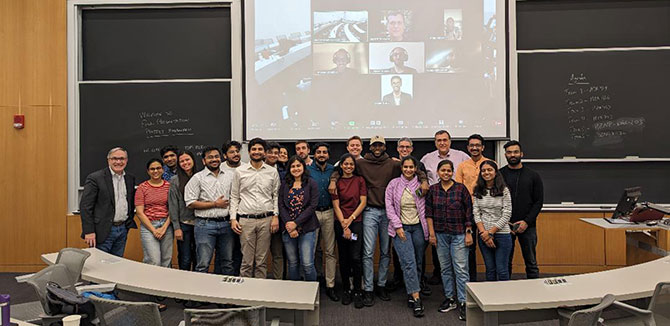Presenting Project Management to the Pros
MEM students shared drug discovery project plans with industry veterans to cap off their Project Management course.

Jim Martucci (MEM '05) turned to Northwestern's Master of Engineering Management (MEM) program to learn business skills and how they apply to technology fields. Nearly 20 years after graduating, Martucci now shares many of those same lessons with current MEM students.
Martucci, who runs his own medical device technology consultancy, served as a guest judge for the program's Project Management final presentation.
"The presentations were well thought-out and data-driven," Martucci said. "The students are very capable and seem to function well as a team. It was hard for me to determine which team members did the heavy lifting."
The course is designed to provide an overview of how the project management field can be applied to technology intensive, product development projects. Students learn project management fundamentals, applications, and use cases, while also discovering techniques and factors relevant to project success in a high-risk, high-technology environment,
For the final project, students are divided into teams and asked to create a large drug discovery project plan for biotechnology company Amgen. Their plans were based on new drugs in the Amgen pipeline and used historical data from the U.S. Food and Drug Administration.
Tom Zerull, senior director for global functions compliance at Amgen, also served as a guest judge for the presentations.
"It's important for us to have industry professionals participate in the judging process for the class," said MEM director Mark Werwath, who teaches the Project Management course. "These guys built their careers on these skills and ideas. They understand the importance of what we're teaching, and they can supplement that information with knowledge and experience they've gained throughout their careers."
Martucci spent 30 years at medical equipment manufacturer Baxter. He spent time as a program director, director of research and development, and ultimately senior director for technology assessment and scouting.
He currently is a member of the MEM Industry Advisory Board.
Martucci was impressed by the depth of work the students showcased.
"Some teams even developed a SWOT analysis — meaning Strengths, Weaknesses, Opportunities, and Threats — to understand the risks for the project," Martucci said. "I reinforced that prediction models are a good starting point, but the students need to understand the assumptions regarding how they were built and adjust accordingly for the project at hand."
Project management is one of the most popular areas of interest for MEM students. Being able to present to, interact with, and learn from experienced industry professionals is a great way for those students to become better prepared to thrive after graduation, Werwath said.
"I hope students learned more about how the industry works, and I'm confident they were able to sharpen their presentation skills," he said. "What was great is they were able to take the lessons learned in class and apply them to a real-life situation. That experience becomes invaluable, and over the years has helped a number of students land great project management jobs."

